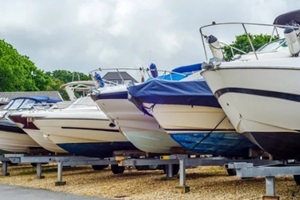 When deciding where to store your boat in New York, one key factor is how your choice affects your New York marine insurance policy. If you file a claim, the level of security and exposure to risk events such as storms can impact your coverage requirements, premiums, and out-of-pocket costs.
When deciding where to store your boat in New York, one key factor is how your choice affects your New York marine insurance policy. If you file a claim, the level of security and exposure to risk events such as storms can impact your coverage requirements, premiums, and out-of-pocket costs.
As a New York boat owner, properly securing your vessel should be a top priority to avoid unnecessary damage and access insurance discounts.
Assessing Your Boating and Storage Needs
Before choosing between keeping your boat at a dock, marina, driveway, or garage, consider how often you use it. Boats stored at home are convenient for frequent outings but require more hands-on preparation before launching. Meanwhile, boats left in the water are quick to access but more vulnerable to the elements over time.
If you only occasionally use your boat for summer weekends and holidays, a marina slip may suit your needs better than a private lift or taking up home garage space year-round. Determine what level of effort and time your lifestyle is when launching your boat. Frequent captains may prefer the instant access of dock storage.
Also, set a budget range, as storage costs can vary greatly depending on factors such as level of security, access to launches, specialized equipment, full-service staff availability, and whether a covered spot is guaranteed for your vessel.
More protective methods come at a higher monthly or seasonal premium, while basic outdoor parking is typically the lowest expense option but leaves your boat more vulnerable to various risks. Security is another consideration — what risks concern you most?
Indoor storage virtually eliminates weather threats, with facilities guarded 24/7 in many cases. Outdoor yards leave boats accessible for tampering and vulnerable if severe winds or floods arise. Review past storms and crime rates to gauge realities.
Benefits and Limitations of Dock/Marina Storage
Choosing a dock or marina rental space allows New York boaters quick entry to the open water come boating season. Simply park, unlock the gate, and undo dock lines; you’re ready to launch without trailering. Many facilities include electrical hookups, sewage pump-out stations, dedicated parking, and clubhouses.
On the other hand, space constraints may restrict the size of vessels that can be accommodated. You’ll also pay a premium for round-the-clock security, proximity to launches, specialized equipment, full-service staff, and spot guarantees. Prepare to budget monthly or seasonal costs ranging from one to several thousand dollars.
 While docks and marinas guard against certain risks, boats still sit exposed to damaging surges, floods, winds over 75 mph, and nor’easters. Check if potential facilities have hurricane plans to secure boats inland and ask about past storm damage claims.
While docks and marinas guard against certain risks, boats still sit exposed to damaging surges, floods, winds over 75 mph, and nor’easters. Check if potential facilities have hurricane plans to secure boats inland and ask about past storm damage claims.
Be ready to remove valuables and electronics before storms. Consider added coverage, such as hurricane haul-out insurance, if available. Double-check before leaving your boat, especially if it’s a high-value boat like a yacht.
Advantages and Drawbacks of Driveway/Garage Storage
Storing your boat at home costs significantly less than at a marina. You’ll also have complete control and access whenever needed without coordinating with staff. This works well if you use your boat nearly every weekend or live close to your preferred launch ramp.
However, few residential driveways can accommodate larger boats over 25 feet. Backyard storage still leaves vessels vulnerable to falling trees, wild animals, severe storms with flying debris, and theft. Over time, exposure shortens the lifespan of fabric canopy covers, gel coat finishes, wood trim, and other components.
Keep boats well-covered or garaged to prevent surface cracking, furniture fading, and electronics failures. Invest in hail-resistant canvas, sturdy support frames, good locks, and anchoring hardware. Home security cameras provide further protection and proof if any damage arises. Keep vehicles insured for comprehensive claims, including vandalism or storms.
How New York Marine Insurance Changes With Storage
New York boat policies contain provisions specific to vessels in dry storage versus continual water submersion. Hull insurance generally only covers damage occurring in the water, so policies must be endorsed to include land-based risks such as wind, hail, lightning strikes, theft, and more. This usually costs a small additional premium.
The boat contents are also covered if stored year-round at the insured party’s premises. For boats kept in indoor facilities, insurance often qualifies for anti-theft discounts. Rates also tend to run lower overall for boats shielded from continual sun, water, and saline that accelerate wear over time.
On the other hand, outdoor storage provides less protection, so that claims may fall under higher deductibles. Improperly secured boats denied storm claims if owners ignore weather warnings, so follow any facility’s advance protocols. Keep documents proving proper preparation, such as photos, haul-out receipts, or checklists.
Contact JMG to Find Your Next Boat Insurance Policy
 Consider a checklist covering convenience, security, cost, insurance requirements, and customization when deciding between marina, dock, driveway, or garage storage options. Think through worst-case scenarios — could you quickly access and secure your boat if a hurricane arose?
Consider a checklist covering convenience, security, cost, insurance requirements, and customization when deciding between marina, dock, driveway, or garage storage options. Think through worst-case scenarios — could you quickly access and secure your boat if a hurricane arose?
Weigh preferences against the practical limitations of each method before choosing what makes sense for your needs. Whatever you select, proper vessel maintenance and damage prevention will save you money and headaches. Consider investing in storm-grade covers for outdoor storage or monthly shrink wrapping. Especially if you own a boating business.
Plus, you can make your boat a less attractive target for unscrupulous characters by upgrading to bolt-locking stands, wheel boots, and hitch locks while removing electronics when the boat is unattended.
JMG Insurance Agency’s experts are here to help regarding your marine insurance needs. We can ensure your New York boat investment stays protected on land and sea, tailored to your storage situation.
Contact us today at 1-844-304-7332 or online for guidance securing the right policy at the right price no matter where your boat calls home when you’re not using it.




